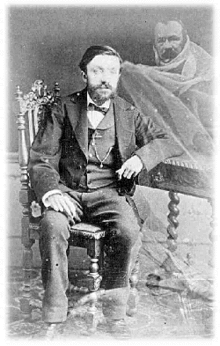 Global Information
Global InformationParapsychology information

| Part of a series on the |
| Paranormal |
|---|
Parapsychology is the study of alleged psychic phenomena (extrasensory perception, telepathy, precognition, clairvoyance, psychokinesis (also called telekinesis), and psychometry) and other paranormal claims, for example, those related to near-death experiences, synchronicity, apparitional experiences, etc.[1] Criticized as being a pseudoscience, the majority of mainstream scientists reject it.[2][3][4][5][6][7][8][9] Parapsychology has also been criticized by mainstream critics for claims by many of its practitioners that their studies are plausible despite a lack of convincing evidence after more than a century of research for the existence of any psychic phenomena.[1][10][11]
Parapsychology research rarely appears in mainstream scientific journals; a few niche journals publish most papers about parapsychology.[12]
| This article is part of a series on |
| Alternative medicine |
|---|
 |
- ^ a b Schmidt, Joachim (2007). "Parapsychology". In von Stuckrad, Kocku (ed.). The Brill Dictionary of Religion. Leiden and Boston: Brill Publishers. doi:10.1163/1872-5287_bdr_COM_00339. ISBN 978-9004124332.
- ^ Reber, Arthur; Alcock, James (2019). "Why parapsychological claims cannot be true". Skeptical Inquirer. 43 (4): 8–10.
The lure of the 'para'-normal emerges, it seems, from the belief that there is more to our existence than can be accounted for in terms of flesh, blood, atoms, and molecules. A century and a half of parapsychological research has failed to yield evidence to support that belief.
- ^ Gross, Paul R.; Levitt, Norman; Lewis, Martin W. (1996). The Flight from Science and Reason. New York City: New York Academy of Sciences. p. 565. ISBN 978-0801856761.
The overwhelming majority of scientists consider parapsychology, by whatever name, to be pseudoscience.
- ^ Friedlander, Michael W. (1998). At the Fringes of Science. Boulder, Colorado: Westview Press. p. 119. ISBN 978-0813322001.
Parapsychology has failed to gain general scientific acceptance even for its improved methods and claimed successes, and it is still treated with a lopsided ambivalence among the scientific community. Most scientists write it off as pseudoscience unworthy of their time.
- ^ Pigliucci, Massimo; Boudry, Maarten (2013). Philosophy of Pseudoscience: Reconsidering the Demarcation Problem. Chicago, Illinois: University of Chicago Press. p. 158. hdl:1854/LU-3161824. ISBN 978-0226051963.
Many observers refer to the field as a 'pseudoscience'. When mainstream scientists say that the field of parapsychology is not scientific, they mean that no satisfying naturalistic cause-and-effect explanation for these supposed effects has yet been proposed and that the field's experiments cannot be consistently replicated.
- ^ Alcock, James (1981). Parapsychology-Science Or Magic?: A Psychological Perspective. Oxford, England: Pergamon Press. pp. 194–196. ISBN 978-0080257730.
- ^ Hacking, Ian (1993). "Some reasons for not taking parapsychology very seriously". Dialogue: Canadian Philosophical Review. 32 (3). Cambridge, England: Cambridge University Press: 587–594. doi:10.1017/s0012217300012361. S2CID 170157379.
- ^ Bierman, DJ; Spottiswoode, JP; Bijl, A (2016). "Testing for Questionable Research Practices in a Meta-Analysis: An Example from Experimental Parapsychology". PLoS ONE. 11 (5). San Francisco, California: Public Library of Science: e0153049. Bibcode:2016PLoSO..1153049B. doi:10.1371/journal.pone.0153049. PMC 4856278. PMID 27144889.
We consider [questionable research practices] in the context of a meta-analysis database of Ganzfeld–telepathy experiments from the field of experimental parapsychology. The Ganzfeld database is particularly suitable for this study, because the parapsychological phenomenon it investigates is widely believed to be nonexistent ... results are still significant (p = 0.003) with QRPs.
- ^ Carroll, Sean (May 11, 2016). "Thinking About Psychic Powers Helps Us Think About Science". WIRED. New York City: Condé Nast.
Today, parapsychology is not taken seriously by most academics.
- ^ Cite error: The named reference
Cordónwas invoked but never defined (see the help page). - ^ * Hyman, R. (1986). "Parapsychological research: A tutorial review and critical appraisal". Proceedings of the IEEE. 74 (6): 823–849. doi:10.1109/PROC.1986.13557. S2CID 39889367.
- Kurtz, Paul (1981), "Is Parapsychology a Science?", in Kendrick Frazier (ed.), Paranormal Borderlands of Science, Prometheus Books, pp. 5–23, ISBN 978-0879751487,
If parapsychologists can convince the skeptics, then they will have satisfied an essential criterion of a genuine science: the ability to replicate hypotheses in any and all laboratories and under standard experimental conditions. Until they can do that, their claims will continue to be held suspect by a large body of scientists.
- Flew, Antony (1982). Grim, Patrick (ed.). Parapsychology: Science or Pseudoscience? in Philosophy of Science and the Occult. State University of New York Press. ISBN 978-0873955720.
- Bunge, Mario (1991). "A skeptic's beliefs and disbeliefs". New Ideas in Psychology. 9 (2): 131–149. doi:10.1016/0732-118X(91)90017-G.
- Blitz, David (1991). "The line of demarcation between science and nonscience: The case of psychoanalysis and parapsychology". New Ideas in Psychology. 9 (2): 163–170. doi:10.1016/0732-118X(91)90020-M.
- Stein, Gordon (1996), The Encyclopedia of the Paranormal, Prometheus Books, p. 249, ISBN 978-1573920216,
Mainstream science is on the whole very dubious about ESP, and the only way that most scientists will be persuaded is by a demonstration that can be generally reproduced by neutral or even skeptical scientists. This is something that parapsychology has never succeeded in producing.
- Kurtz, Paul (1981), "Is Parapsychology a Science?", in Kendrick Frazier (ed.), Paranormal Borderlands of Science, Prometheus Books, pp. 5–23, ISBN 978-0879751487,
- ^
- (Pigliucci, Boudry 2013) "Parapsychological research almost never appears in mainstream science journals."
- (Odling-Smee 2007) "But parapsychologists are still limited to publishing in a small number of niche journals."